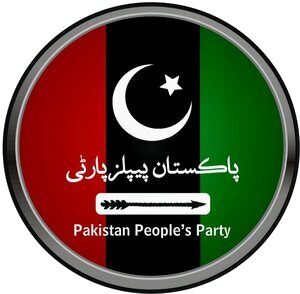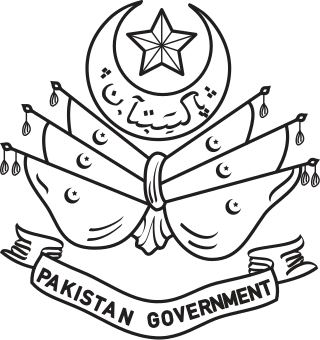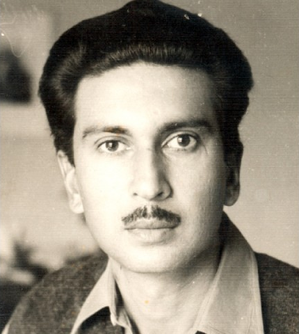| |||||
| Decades: | |||||
|---|---|---|---|---|---|
| See also: | |||||
Events from the year 1973 in Pakistan.
| |||||
| Decades: | |||||
|---|---|---|---|---|---|
| See also: | |||||
Events from the year 1973 in Pakistan.

Zulfikar Ali Bhutto was a Pakistani barrister, politician and statesman who served as the fourth president of Pakistan from 1971 to 1973, and later as the ninth prime minister of Pakistan from 1973 to 1977. He was the founder of the Pakistan People's Party (PPP) and served as its chairman until his execution.

The Pakistan People's Party is a centre-left, social-democratic political party in Pakistan. It is currently the second-largest party in the Senate. The party was founded in 1967 in Lahore, when a number of prominent left-wing politicians in the country joined hands against the military rule of president Muhammad Ayub Khan, under the leadership of Zulfikar Ali Bhutto. It is affiliated with the Socialist International. The PPP's platform was formerly socialist, and its stated priorities continue to include transforming Pakistan into a social-democratic state, promoting egalitarian values, establishing social justice, and maintaining a strong military. The party, alongside the Pakistan Muslim League-Nawaz and the Pakistan Tehreek-e-Insaf, is one of the three largest political parties of Pakistan.

The president of Pakistan, is the head of state of the Islamic Republic of Pakistan. The president is the nominal head of the executive and the supreme commander of the Pakistan Armed Forces. Arif Alvi is the 13th and current president, in office since 9 September 2018.
Ghulam Ishaq Khan, commonly known by his initials GIK, was a Pakistani bureaucrat, politician and statesman who served as the seventh president of Pakistan from 1988 to 1993. He previously served as Chairman of the Senate from 1985 to 1988 under president Muhammad Zia-ul-Haq, and was sworn in shortly after Zia's death.

The Constituent Assembly of Pakistan was established in August 1947 to frame a constitution for Pakistan. It also served as its first interim parliament. It was dissolved by the Governor-General of Pakistan in 1954.

Rahimuddin Khan was a general of the Pakistan Army who served as the 4th Chairman Joint Chiefs of Staff Committee from 1984 to 1987, after serving as the 7th governor of Balochistan from 1978 to 1984. He also served as the 16th governor of Sindh in 1988.
Events from the year 1972 in Pakistan.
Mumtaz Ali Khan Bhutto, was a Pakistani politician who served as 8th Governor of Sindh and later the 13th Chief Minister of Sindh. He was also the first cousin of late Zulfiqar Ali Bhutto, who was the Prime Minister of Pakistan from 1973 to 1977.
Events from the year 1974 in Pakistan.
Events from the year 1975 in Pakistan.
Events from the year 1977 in Pakistan.

Hayat Mohammad Khan Sherpao, simply known as Hayat Sherpao, was a left-wing intellectual and socialist, serving as the 15th Governor of North West Frontier Province of Pakistan, as well as vice-chairman of Pakistan People's Party. Sherpao held important executive offices, including served as the Interior minister and had held a number of provincial ministries of the North West Frontier Province. He was assassinated in 1975, and his death was blamed on a rival political party in the province - the Awami National Party of Khan Abdul Wali Khan.
The Hyderabad tribunal (1975–1979), also known as Hyderabad conspiracy case, is the name of a former judicial tribunal used in Pakistan to prosecute opposition politicians of the National Awami Party on the charges of treason and acting against the ideology of Pakistan.
The political history of Pakistan is the narrative and analysis of political events, ideas, movements, and leaders of Pakistan. Pakistan gained independence from the United Kingdom on 14 August 1947, when the Presidencies and provinces of British India were divided by the United Kingdom, in a region which is commonly referred to as the Indian subcontinent. Since its independence, Pakistan has had a colorful yet turbulent political history at times, often characterized by martial law and inefficient leadership.
Events from the year 1995 in Pakistan.
Events from the year 2008 in Pakistan.

The vice president of Pakistan was a political office which existed between 1971 and 1973. In practice, it was the second highest office in the country after the president of Pakistan, holding the status of the deputy head of state, and ranking first in the presidential line of succession. Established in December 1971, the post remained in effect until the 1973 Constitution of Pakistan was promulgated in August 1973, under which it was formally abolished.

Khan Amirzadah Khan was a member of the Khudai Khidmatgar movement and a leader of the National Awami Party in Pakistan. Born in Bakhshali village, Mardan District in the province of Khyber Pakhtunkhwa, he was an active participant of Khudai Khidmatgar movement organized by Bacha Khan. Amirzada Khan started active politics with National Awami Party and remained President of National Awami Party District Mardan until 1972, when he remained senior Provincial Minister of Law, Education and Parliamentary Affairs.
The family of head of state and government in Pakistan is an unofficial title for the family of the head of state or head of government of a country. In Pakistan, the term First Family usually refers to the head of state or head of government, and their immediate family which comprises their spouse and their descendants. In the wider context, the First Family may comprise the head of state or head of government's parents, siblings and extended relatives.